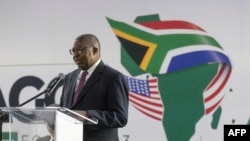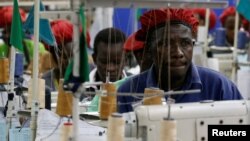For the next three days, African governments and private companies will engage counterparts from the U.S. about improving AGOA — the U.S.-Africa trade program that gives eligible sub-Saharan African countries duty-free access to the U.S. market for more than 1,800 products.
Kenny Fihla, an executive at South Africa’s Standard Bank, says the pact has become "indispensable" to the economic growth of many countries since it launched under former U.S. President Bill Clinton 23 years ago.
"The automobile sector in South Africa is a massive exporter into the U.S. If you look at the smaller countries who are producing apparels and textiles, they’re also benefiting hugely, having been able to export around $1.5 billion (worth of goods) into the U.S, and there’s still massive scope for growth," Fihla told VOA.
In 2021, U.S. goods trade — exports and imports — with sub-Saharan Africa totaled $44.9 billion, according to the Office of the United States Trade Representative. The top exporters to the U.S. were South Africa, Nigeria, Ghana, Ethiopia and Kenya.
Fihla says if the scope of AGOA is widened to cover more countries, the program can be beneficial to more of Africa’s economies.
"If one looks at the potential of expanding exports, widening the scope to cover more countries included in AGOA, as well as increasing volumes, there’s no doubt this is hugely beneficial to African economies and will also help us modernize our own production and improve the quality of our goods," he said.
South African economist Kevin Lings told VOA a major point of discussion at this week's summit will be the underutilization of AGOA.
Only about half of the countries that qualify for the program have developed strategies designed to make best use of AGOA, he said, with most exports to the U.S. only coming from a few beneficiaries.
"The sub-Saharan African continent exports way more to China in a year than it does to the U.S., even though we’ve got preferential access to the U.S.," Lings said.
"One of the reasons is that there isn’t enough knowledge in Africa about, 'how do I get access to this preferential trade agreement; how do I get my goods included; who do I speak to?' There’s a lot that can be done to simply boost peoples’ awareness," he added.
President Joe Biden on Wednesday issued a statement urging Congress to reauthorize AGOA by 2025, saying it has been a bedrock for U.S. trade with sub-Saharan Africa.
"I encourage Congress to reauthorize AGOA in a timely fashion and to modernize this important Act for the economic opportunities of the coming decade," Biden’s statement said.
Earlier this week, Biden said he plans to expel Uganda, Gabon, Niger and the Central African Republic, or CAR, from the special trade program for their involvement in "gross violations" of human rights or not making progress towards democratic rule.
Uganda has criticized the move, saying the action is intended to punish African countries who resist Western cultural values.
J. Peter Pham, former U.S. special envoy to the Sahel region of Africa, said when Congress created AGOA, they had three criteria for joining countries.
"One, the country had to be making reforms toward a market economy, liberalization and transparency. Secondly, the country had to be respect the rule of law including not having unconstitutional changes of government and not carrying out human rights abuses. And thirdly, the country should not be undermining U.S. foreign policy interests or national security," Pham told VOA.
Pham noted that recent military coups in Niger and Gabon, government-sanctioned rights abuses in CAR and anti-LGBTQ+ legislation in Uganda as reasons for their expulsion.
The four African countries are set to be terminated as beneficiaries under AGOA on January 1, 2024.
Meanwhile, Mauritania will be reinstated on the same day, after the northwest African country made "substantial and measurable progress on worker rights and eliminating forced labor," the U.S. Trade Representative's Office said this week.
Report Darren Taylor and VOA’s Carol Vam Dam contributed to this report. Some information for this report came from Reuters.



Forum